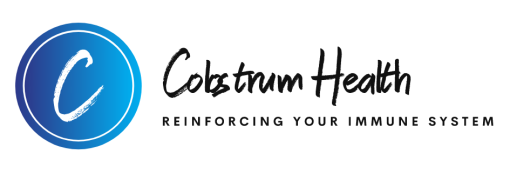Colostrum - Did you Know ?
The Science of Colostrum
ALPHA LIPID™ THE SCIENTIFIC ADVANTAGE
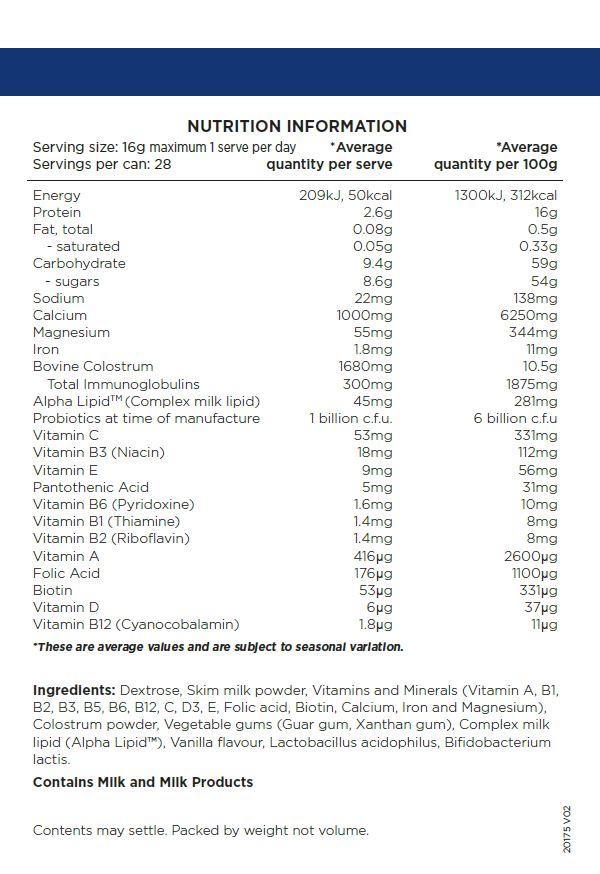
Alpha Lipid™ Lifeline™
Colostrum Ingredients
The Original Breakfast Shake
- Support your immunity with 1,600mg of Colostrum* containing 300mg of Immunoglobulins.
- Improve your gut health & digestive comfort with 1 billion probiotics per dose.
- Contains essential vitamins and minerals.
- 1,000mg of calcium for healthy teeth and bones.
- Assists the body’s natural repair process.
- Best taken as a pre-breakfast cold drink or include it with your morning smoothie.
Defence:Colostrum’s natural antibodies build immunity through gut health.
Energy:Probiotics and proteins aid digestion, helping you feel more energised and balanced.
Focus:When you have the right balance of nutrients and a healthy digestive system to absorb them, your body and mind are naturally healthier and more focussed.
Alpha Lipid™ Lifeline™ breakfast drink combines colostrum and probiotics for powerful immune and digestive system support to help you feel balanced, healthy and strong.
*based on daily dose.

How to Boost Your Immune Sytem
To Avoid, Ills and Chills
The cold season is upon us. Boosting our immune systems has rarely felt more urgent. You’re washing your hands 10 times a day and have stopped touching your face. What else can you do to improve your health and avoid ills and chills?
To know how to take care of your immune system, first you need to understand the weapons in your armoury.
When you come into contact with a germ you’ve never met before, you’ve got various barriers to try to stop it getting into your body. As well as skin, we have mucus – snot is a really important barrier – and a microbiome, it is estimated that 100 trillion microbes live throughout our bodies, internally and externally.
Beneath the swamps of mucus and microbes, our bodies are lined with epithelial cells which, are really hard to get through. They make antimicrobial products including antiviral compounds that are quite hostile.
If a pathogen breaches these defences, it has to deal with our white blood cells, or immune cells. One type, called macrophages, inhabit all our body tissue and, have all these weapons ready to go, but they’re not terribly precise. They report to the cleverer, adaptive white blood cells known as lymphocytes. They are the ones that remember germs, so if you meet that germ again, they’ll just
eal with it probably without you even knowing. That’s when you’ve got immunity. It’s trying to bypass all the early stuff and create the memory, so you don’t have to be sick.
Our immune systems may have blind spots. This might mean that our immune response doesn’t recognise certain bugs, or the bugs have sneaky evasion strategies. A healthy lifestyle will ensure your defences are as good as they get.
Seeing as our bodies contain more cells belonging to microbes, (such as bacteria), than human ones, let’s start with the microbiome. We live in a symbiotic relationship with our gut bacteria. Having the right ones around, is best for our health. Anything we do that alters that can be detrimental.
The best way to increase microbiome diversity in our immune system is by eating plenty of high-fibre foods. The ‘bad’ bacteria tend to feed on sugar and unhealthy fats. The single most important nutrient that good bacteria need to thrive inside you is fibre. Because we don’t eat enough fibre, Fibremax™ is your detoxing superhero! Fibre is essential for a healthy digestive tract.
You can also support your microbiome by regularly eating natural yoghurt, which contain live microbes (probiotics).
Probiotics are tiny organisms that your gut loves. Probiotics are often called ‘good bacteria’ because they help keep your gut healthy.
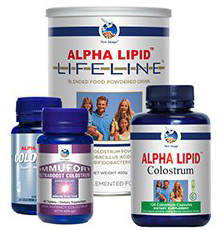
You can supplement probiotics with Alpha Lipid™ Lifeline™ Colostrum contains natural antibodies that build immunity through gut health. Alpha Lipid Lifeline Colostrum Drink
To be immunologically fit, you need to be physically fit. White blood cells can be quite sedentary. Exercise mobilises them by increasing your blood flow, so they can do their surveillance jobs and seek and destroy in other parts of the body. You should be physically active in some way every day and do at least 150 minutes a week of moderate aerobic activity (hiking, gardening, cycling) or 75 minutes of vigorous activity (running, swimming fast, an aerobics class).
One of the many happy side-effects of exercise is that it reduces stress, which is next on our list of immune-boosting priorities. Stress hormones such as cortisol can compromise immune function, a common example of which, is when chickenpox strikes twice. If you have had it, the virus never completely goes away. During periods of stress it can reactivate again, and we get shingles.
Forget boozing because heavy drinking also depletes our immune system cells. Some studies have suggested that the first line-of-defence macrophages are not as effective in people who have had a lot of alcohol. And there’s been suggestions that high alcohol consumption can lead to a reduction of the lymphocytes as well. So, if the bug gets into you, you’re not going to be as good at containing and fighting it off.
Exercising and eating well will have the likely knock-on effect of helping you sleep better, which is a bonus because a tired body is more susceptible to bugs.
The biggest thing is hygiene. So wash your hands, and sneeze and cough into your elbow. No one can completely avoid getting sick, not even top immunologists.
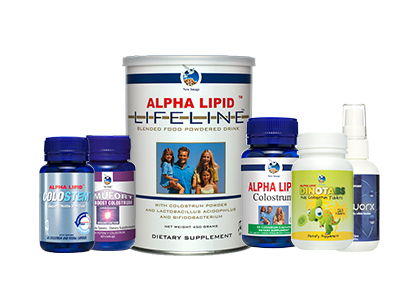
Alpha Lipid ™
Scientific Advantage
Not all colostrum products
are created equal

To obtain the maximum benefits of colostrum it is
important that as much natural bioactive colostrum is
delivered to the body as possible. Coating colostrum
particles using the exclusive Alpha Lipid™ process
ensures they are protected as they pass through the
harsh stomach environment. The Alpha Lipid™ coating
is both water and fat soluble, improving dispersion
and absorption of the colostrum particles into the
body. A large number of scientific studies now support
the health benefits of colostrum and New Image
International has the only patent-protected colostrum
product in the world.
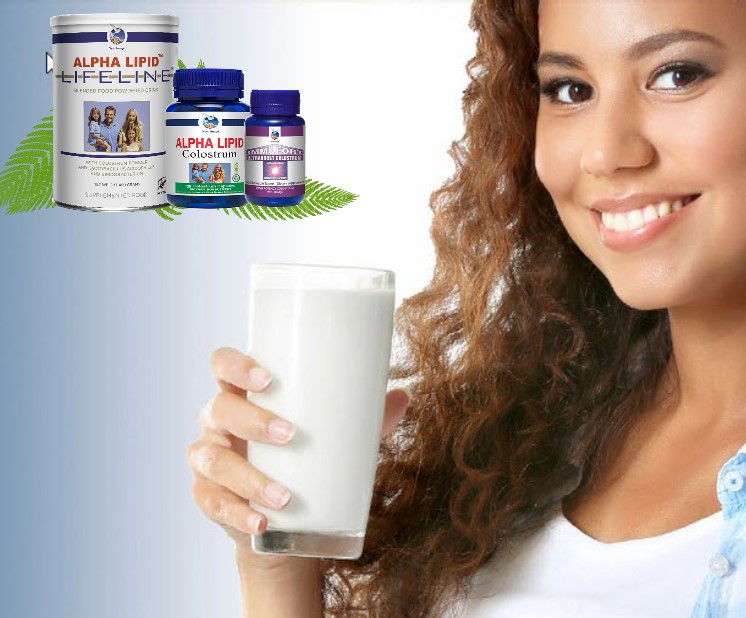
Colostrum & Lactose
Digestive Discomfort
Lactose and Colostrum many people experience digestive discomfort and for some, it’s caused by ingredients in certain foods such as the naturally occurring sugar in milk.
This sugar is called lactose and if we can’t digest it, we can end up with symptoms including:
• Digestive upset
• Bloating
• Flatulence
• Irregular bowel activity
• Queasiness
Lactose intolerance is caused by a deficiency of the enzyme lactase. Without lactase, the body can’t breakdown lactose for digestion. Production of lactase decreases as we age so adults are more likely to suffer from lactose intolerance than children. The prevalence of lactose intolerance varies between nations; in Australia and New Zealand it is estimated to effect less than 10% of the population. In most Asian populations the prevalence is much higher with statistics ranging from 15% to over 90% depending on the specific population studied. The degree of lactose intolerance also varies, with some people happily being able to ingest small to moderate amounts of dairy based foods, while others have a much lower tolerance. The good news is, colostrum is naturally low in lactose – 1 gram of colostrum has approximately 60mg (0.06g) – so it’s unlikely to cause digestive upset and may even help support healthy digestion so your system works smoothly and efficiently, as it’s meant to. Colostrum does this by supporting the health of gut tissue, for naturally efficient absorption, digestion and elimination. Colostrum and probiotics may also help maintain a healthy
balance of bacteria in the gut. The amount of lactose in a daily serve of 2 grams of pure colostrum is less than a teaspoon of milk in your cup of tea – If you are able to tolerate a small amount of milk or yoghurt, then you are likely to be able to tolerate a moderate daily intake of colostrum. It is advisable to start any colostrum product at a low dose to test your tolerance, building up slowly to the full dose. If you have a severe lactose intolerance or dairy allergy we recommend that you contact your healthcare provider for specific advice on how to proceed.
